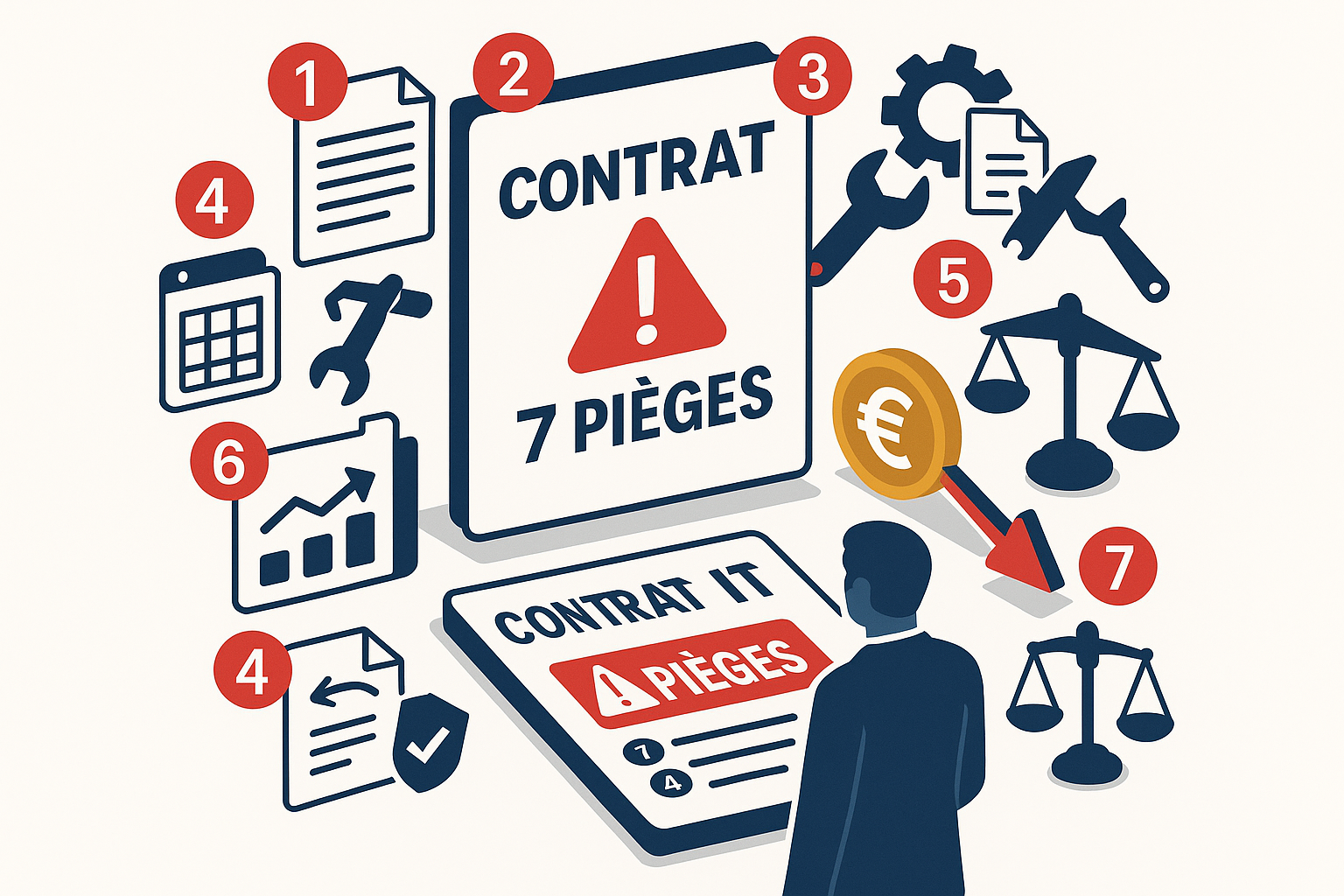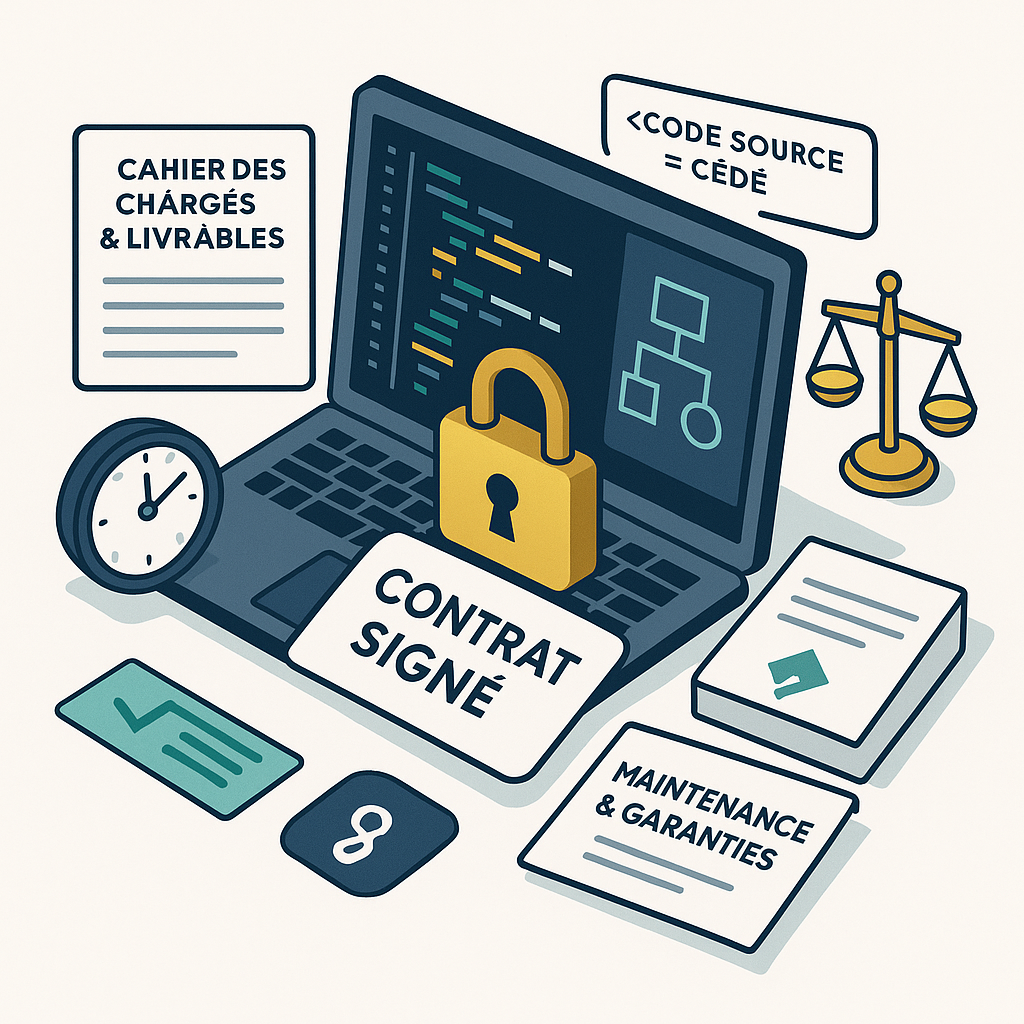
Contrats de prestation informatique : 7 pièges qui peuvent coûter cher à votre entreprise
Les contrats de prestation informatique recèlent souvent des pièges qui peuvent entraîner des conséquences considérables.
Les activités sur Internet sont encadrées par des réglementations spécifiques qui évoluent constamment. Que vous soyez une entreprise e-commerce, une plateforme numérique, ou un prestataire de services en ligne, il est essentiel de maîtriser les enjeux juridiques liés à vos activités.

Les entreprises opérant sur Internet doivent respecter un ensemble de règles juridiques couvrant des domaines variés tels que la protection des données personnelles, le commerce électronique, les droits de propriété intellectuelle, et la conformité aux réglementations spécifiques du Web.
Un encadrement juridique solide permet de prévenir les risques de litiges et de garantir la sécurité de vos activités en ligne.
Ces dernières impliquent de nombreux textes juridiques (RGPD, Propriété intellectuelle, cybersécurité …) tout en impliquant des principes de droit commercial (responsabilité, transfert de propriété …).
Protection des données personnelles et RGPD : Toute activité en ligne qui implique le traitement des données personnelles doit respecter le RGPD et les autres lois sur la protection de la vie privée. Cela inclut la mise en place de politiques de confidentialité et de mesures de sécurité appropriées pour protéger les informations des utilisateurs.
Commerce électronique : Les entreprises opérant dans le commerce en ligne doivent se conformer à des règles spécifiques concernant la gestion des transactions, les conditions de vente, la protection des consommateurs, et la gestion des litiges en ligne. Des contrats clairs et des conditions générales d’utilisation sont indispensables pour garantir la transparence avec les clients.
Propriété intellectuelle : La diffusion de contenus sur Internet (textes, images, vidéos, logiciels) doit respecter les droits de propriété intellectuelle. Il est crucial de protéger vos créations contre la contrefaçon tout en garantissant que votre entreprise ne viole pas les droits des tiers.
Conseil et Assistance : Nous vous conseillons dans la gestion des aspects juridiques de vos activités en ligne, que ce soit pour la conformité au RGPD, la gestion des contrats numériques, ou la protection de vos droits de propriété intellectuelle.
Représentation et Défense des intérêts : En cas de litige lié à vos activités en ligne, qu’il s’agisse de violations de données, de conflits contractuels, ou de contentieux en matière de propriété intellectuelle, nous défendons vos intérêts de manière rigoureuse.
Formation et Sensibilisation : Nous proposons des formations pour sensibiliser vos équipes aux bonnes pratiques juridiques sur Internet, afin de prévenir les risques et de garantir la conformité de vos activités en ligne.

Nous analysons vos activités en ligne afin d’identifier les risques juridiques liés à la gestion des données, à la conformité réglementaire, et à la protection des droits d’auteur. Cette évaluation permet de mettre en place des mesures adaptées pour protéger vos activités sur Internet.

Suite à notre analyse, nous mettons en place des stratégies juridiques pour garantir la conformité de votre activité en ligne, notamment en matière de protection des données personnelles, de gestion des transactions, et de sécurité des contenus numériques.

Nous proposons des formations sur le droit du numérique pour vos équipes, afin qu’elles soient à jour sur les bonnes pratiques en matière de conformité numérique, de gestion des données et de protection de la propriété intellectuelle.

Nous assurons un suivi juridique régulier pour vous garantir que vos pratiques en ligne restent conformes aux évolutions législatives et aux nouvelles réglementations du Web, tout en vous accompagnant dans vos nouvelles initiatives numériques.
Violation des obligations en matière de données personnelles : Une mauvaise gestion des données personnelles peut entraîner des sanctions sévères, notamment des amendes importantes pour non-conformité au RGPD.
Conflits liés aux transactions en ligne : Les litiges avec les consommateurs ou les partenaires commerciaux concernant les conditions de vente, les remboursements, ou la livraison peuvent nuire à la réputation de l’entreprise et entraîner des pertes financières.
Propriété intellectuelle et contrefaçon : La diffusion de contenus protégés par le droit d’auteur ou la violation des droits de tiers sur Internet peut entraîner des sanctions légales et des réclamations financières importantes.
Cybersécurité et violations : Les cyberattaques ou les violations de la sécurité des systèmes exposent les entreprises à des pertes de données sensibles et à des sanctions en cas de non-respect des règles de sécurité appropriées

Les contrats de prestation informatique recèlent souvent des pièges qui peuvent entraîner des conséquences considérables.

Décryptons ensemble les points d’attention essentiels pour sécuriser juridiquement votre projet de migration vers le

Le développement d’un logiciel sur mesure représente un investissement stratégique majeur pour une entreprise. Au-delà
Choisir un avocat spécialisé en droit de l'internet est crucial pour les entreprises évoluant dans le monde numérique. Les défis juridiques associés à la cybersécurité, à la protection des données personnelles et à la conformité réglementaire nécessitent des compétences spécifiques. Un avocat expert dans ce domaine est en mesure d'offrir des conseils précis et de représenter efficacement les clients face aux complexités légales liées à l'internet. Avec l'évolution rapide des technologies, il est essentiel d'avoir un partenaire juridique capable d'anticiper et de répondre aux enjeux juridiques du monde digital.
En outre, un avocat spécialisé peut aider à élaborer des stratégies de conformité proactive, prévenir les litiges et assurer une gestion efficace des crises en ligne. Que vous soyez une startup ou une entreprise établie, l'accompagnement d'un professionnel du droit de l'internet peut faire la différence entre le succès et l'échec dans le paysage numérique moderne.
Opter pour un avocat spécialisé en droit de l'internet comme le cabinet Mirabile Avocat offre de nombreux avantages pour votre entreprise. Ces professionnels possèdent une expertise approfondie dans des domaines tels que la conformité au RGPD, la cybersécurité et les litiges liés à l'e-commerce. Leur connaissance pointue des lois et réglementations spécifiques à l'internet leur permet de fournir des conseils précis et d'aider à prévenir les risques juridiques. De plus, ils sont capables de gérer des situations complexes et d'offrir un accompagnement personnalisé, assurant ainsi que votre entreprise reste protégée et conforme dans un environnement numérique en constante évolution.
La conformité avec le RGPD est cruciale pour toutes les entreprises opérant en ligne. Un avocat spécialisé en droit de l'internet vous aide à comprendre et à respecter ces réglementations, évitant ainsi des amendes sévères. Il peut auditer vos pratiques de gestion des données, rédiger des politiques de confidentialité et former votre personnel pour garantir une conformité continue. En collaborant avec un expert, vous assurez la protection des données personnelles de vos clients, renforçant ainsi leur confiance et votre réputation.
La protection contre le piratage informatique est essentielle pour la sécurité de votre entreprise. Un avocat spécialisé en droit de l'internet peut vous aider à mettre en place des mesures de sécurité robustes pour prévenir les cyberattaques. En cas d'incident, il offre des solutions juridiques pour minimiser les dommages et récupérer rapidement. En travaillant avec un avocat expert, vous pouvez développer une stratégie de cybersécurité proactive, vous protégeant contre les menaces potentielles et assurant la continuité de vos opérations en ligne.
Les services juridiques pour les entreprises en ligne sont essentiels pour assurer une activité commerciale sécurisée et conforme. Parmi ces services, la rédaction de contrats et de conditions générales de vente (CGV) est cruciale. Un avocat spécialisé peut créer des documents légaux sur mesure, adaptés à vos besoins spécifiques, garantissant la clarté et la protection juridique. En outre, la gestion des litiges et contentieux est primordiale. Un avocat expérimenté peut vous représenter efficacement en cas de différends, offrant des solutions adaptées et minimisant les risques pour votre entreprise.
Un avocat spécialisé en droit de l'internet peut rédiger des contrats et des CGV sur mesure, adaptés à votre activité en ligne. Ces documents sont essentiels pour établir des relations commerciales claires et éviter les litiges. En vous assurant que vos contrats sont conformes aux lois en vigueur, vous protégez votre entreprise contre les risques juridiques et vous renforcez la confiance de vos partenaires et clients.
La gestion des litiges et contentieux est un aspect crucial pour les entreprises en ligne. En cas de conflit, un avocat spécialisé peut vous représenter et défendre vos intérêts devant les tribunaux. Il peut également vous conseiller sur les meilleures stratégies pour résoudre les différends à l'amiable, réduisant ainsi les coûts et les impacts négatifs sur votre activité. Avec un avocat à vos côtés, vous êtes mieux préparé pour faire face à toute situation conflictuelle de manière efficace et sereine.
Développer une stratégie numérique efficace est essentiel pour réussir dans le monde en ligne. Un avocat spécialisé peut vous accompagner dans la création de votre entreprise numérique, notamment en fournissant des conseils pour la création de startups et en vous aidant à optimiser votre e-réputation. Une bonne stratégie numérique implique également de rester informé des évolutions technologiques et des réglementations, ce qui vous permet d'anticiper les changements et de rester compétitif.
Un avocat spécialisé en droit de l'internet offre un soutien précieux lors de la création de startups technologiques. Il peut vous conseiller sur les meilleures pratiques juridiques, vous aider à structurer votre entreprise et à sécuriser les aspects juridiques de vos innovations. Grâce à son expertise, vous pouvez éviter les pièges courants et positionner votre startup pour une croissance durable et réussie.
L'optimisation de l'e-réputation est cruciale pour les entreprises en ligne. Un avocat spécialisé peut vous aider à surveiller et à améliorer votre image sur internet, en gérant les avis négatifs et en mettant en place des stratégies pour renforcer votre présence en ligne. Une e-réputation solide attire davantage de clients et renforce la confiance dans votre marque, ce qui est essentiel pour le succès à long terme de votre entreprise.
Choisir un avocat spécialisé en droit de l'internet est essentiel pour naviguer dans le paysage numérique complexe. Que ce soit pour assurer la conformité au RGPD, protéger contre les cyberattaques, ou rédiger des contrats adaptés, un expert en droit de l'internet offre une protection juridique complète. En accompagnant les entreprises dans la création de startups et l'optimisation de leur e-réputation, ces avocats jouent un rôle crucial dans le succès en ligne.